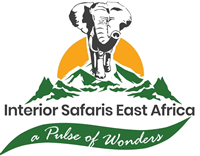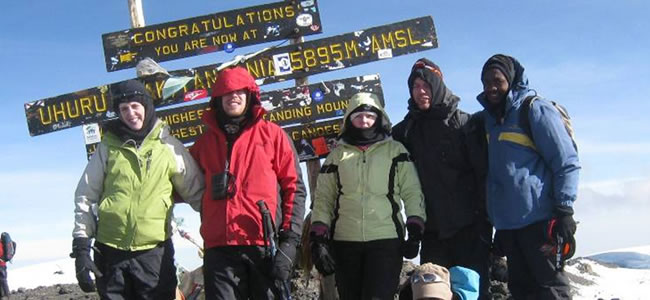
Interior Safaris EA 7 Days Machame Route program starting at Machame gate and ascending via Stella Point. There is a night time ascent to the summit. The trip is fully supported with spacious guest tents, mattress and pillow as well as a mess tent with lightweight tables and chairs and all cutlery.
Our trips also include a toilet tent in camp and most importantly knowledgeable professional guides that go through annual trainings. Our logistics team at our base monitors your trip from start to finish.
Day 1: Machame Gate (1490 m) – Machame Camp (2980 m)
 After an early breakfast at your hotel, you will be picked up from Arusha (1400 m) and driven to the Machame Village. In the village, you can buy mineral water and will receive a packed lunch. From the village, depending on the road conditions, you will either continue driving 3 kilometers or walk to the Machame Gate (1490 m). At the gate, the porters will organize and pack the belongings for the hike while you and your guide register with the Tanzania National Park (TANAPA). You will then begin your ascent into the rain forest. During this section of the hike, you should expect rain, mud, and fog. Also, be on the lookout for wildlife, including Colobus monkeys! About halfway up the trail you will have a lunch break and you will reach the Machame Camp (2980) in the late afternoon or early evening. The porters and chef, who move very fast up the mountain, will reach camp before you and set up your tents, boil drinking water, and prepare snacks for your arrival. After washing up, a hot dinner will be served. For overnight, mountain temperatures may drop to freezing so be prepared.
After an early breakfast at your hotel, you will be picked up from Arusha (1400 m) and driven to the Machame Village. In the village, you can buy mineral water and will receive a packed lunch. From the village, depending on the road conditions, you will either continue driving 3 kilometers or walk to the Machame Gate (1490 m). At the gate, the porters will organize and pack the belongings for the hike while you and your guide register with the Tanzania National Park (TANAPA). You will then begin your ascent into the rain forest. During this section of the hike, you should expect rain, mud, and fog. Also, be on the lookout for wildlife, including Colobus monkeys! About halfway up the trail you will have a lunch break and you will reach the Machame Camp (2980) in the late afternoon or early evening. The porters and chef, who move very fast up the mountain, will reach camp before you and set up your tents, boil drinking water, and prepare snacks for your arrival. After washing up, a hot dinner will be served. For overnight, mountain temperatures may drop to freezing so be prepared.
Day 2: Machame Camp (2980 m) – Shira Camp (3840 m)
After an early morning breakfast, you will start you ascent leaving the rain forest and entering the heath land moorland vegetation. You will cross many streams and walk over a rocky ridge onto the Shira plateau that leads to Shira Camp (3840 m). At this campsite, you will be next to a stream and have a spectacular view of the Western Breach and its glaciers in the East. Similar to the first night, your tents will be set up prior to arriving at camp and the porters will prepare drinking and washing water for you. You will enjoy evening snacks then dinner prepared by our chef. Be prepared for a cold night as temperatures drop below freezing at this exposed camp.
Day 3: Shira (at 3840 m) – Lava Tower (at 4630 m) – Barranco camp (at 3950 m)
Following an early morning breakfast, you will leave the moorland environment and enter the semi desert and rocky landscape. After 5 hours of walking east, you will be come face to face with the Lava Tower (4630 m). Packed lunches are served at the Tower and hikers have the option of climbing the massive Lava Tower weather permitting. At this point of the hike, it is normal for hikers to start feeling the effects from the altitude including headaches and shortness of breath. After lunch, you will descend from Lava Tower (4630 m) to the Barranco Campsite (3950 m). The 6800 m descent gives hikers a huge advantage to allow their bodies to adjust to the conditions of high altitude. The descent to camp takes around 2 hours to reach. It is located in a valley below the Breach and Great Barranco Wall Breakfast Wall. Drinking and washing water and dinner will be served as hikers view the sun setting.
Day 4: Barranco Camp (3950 m) – Karanga Camp (3950 m)
After an early morning breakfast, it is now time to conquer the Great Barranco Wall! Although it may look intimating at first glance, hikers state that this Class 2 hike is usually much easier than they anticipated. At the top of the Wall, you will have a view of Heim Glacier and will be above the clouds. The trail then winds up and down in the Karanga Valley. This is an ideal hiking day for acclimatization.
Day 5: Karanga Camp (3959 m) – Barafu Hut (4600 m)
Following breakfast, you will leave Karanga Camp (3959 m). The trail intersects with the Mweka Route, which is the trail used to descend on the final two days. As you continue hiking for an hour, you will reach Barafu Hut. This is the last water stop for the porters because there is no accessible water at Barafu Camp (4550 m). The word barafu in Swahili means ice and this camp is located on a rocky, exposed ridge. Tents will be exposed to wind and rocks so it is important for hikers to familiarize themselves with the campsite before dark. An early dinner will be served so hikers can rest before attempting the summit the same night. Your guide will brief you in detail on how to prepare for summit night.
Day 6: Summit Attempt
Your guide will wake you around 23:30 for tea and biscuits. You will then begin your summit attempt. The route heads northwest and you will ascend over stone scree. During the ascent, many hikers feel that this is the most mentally and physically challenging part of the climb. In about 6 hours, you will reach Stella Point (5685 m), located on the crater rim. After enjoying the magnificent sunrise, you will continue ascending for about 2 hours on a snow-covered trail to Uhuru Peak (5895 m). Reaching the summit of Mt. Kilimanjaro is a lifetime accomplishment! You will be able to spend a short time on the summit taking photographs and drinking tea before the descent to Barafu begins. The hike down to Barafu Camp takes about 3 hours. At camp, you will rest and enjoy a hot lunch in the sun. After eating, you will continue descending down to Mweka Hut (3100 m). The Mweka Trail will lead you through the scree and rocks to the moorland and eventually into the rain forest. Mweka Camp (3100 m) is located in the upper rain forest, so fog and rain should be expected. You will have a dinner, wash, and rest soundly at camp.
Day 7: Mweka camp (3100 m) – Mweka Gate (1980 m)
Following a well-deserved breakfast, your staff will have a big celebration full of dancing and singing. It is here on the mountain that you will present your tips to the guide, assistant guides, chef(s), and porters. After celebrating, you will descend for three hours back to Mweka Gate. The National Park requires all hikers to sign their names to receive certificates of completion. Hikers who reached Stella Point (5685 m) receive green certificates and hikers who reached Uhuru Peak (5895 m) receive gold certificates. After receiving certificates, hikers will descend into the Mweka village for 1 hour (3 kilometers). You will be served a hot lunch then you will drive back to Arusha for long overdue showers and more celebrations.
End of the tour
Guide price
Price includes:
|
Price does not include:
|
Why do we use guide prices?
The price for every safari depends on the number of people travelling, their ages, the time of year, whether or not international flights are included, the type of transport and accommodation used and the activities undertaken.
We calculate according to the specific dates of your booking because after we publish our itineraries some things may change. For example, hotels may increase their prices, the government may introduce new taxes or some discounts may become available. Unfortunately, we also have to pass on surcharges imposed on us by, for example, airlines when fuel prices or airport taxes are unexpectedly increased.
We would be happy to prepare a quotation, based on your requirements. We normally include most costs in the price so all you need to bring with you is ‘pocket money’ for items like drinks, tips and personal shopping e.g. souvenirs.
Insurance
AMREF flying doctors provide a medevac service in case of illness or injury during your safari. This costs $25pp for 31 days. We recommend this service and can include it in your package price.
Booking
Once you have selected one of our safari packages you need to send us a booking form. When we receive this we will check availability and inform you if any changes are necessary and issue an invoice for a 50% deposit plus the full cost of any tracking permits (in case of cancellation permit fees are non-refundable). Only once this payment is received can we guarantee availability and issue a booking confirmation. Full payment is required 70 days before travel.
Payments and cancellation
We charge in US dollars. Payment is by bank transfer into our Standard Chartered USD bank account in Uganda. You can also pay by credit card although there is a 5% administration charge. For those booking from within Uganda, cash payments are possible at our office.
When we book your safari, we have to pay non-refundable deposits on your behalf, for example to hotels. Therefore, we charge cancellation fees as follows:
30% of reservation costs if you cancel more than 50 days before your arrival date
100% of reservation costs if you cancel less than 50 days before your arrival date
We strongly recommend that you include cancellation cover in your travel insurance.
Disclaimer: We enter into an agreement with you in good faith but we sometimes encounter unexpected changes in local conditions which can affect your itinerary or price. These changes are beyond our control and we are not liable for them. While we endeavour to protect you against the effects of these changes, we reserve the right to amend the agreed itinerary and price in response to them. Such changes include but are not limited to weather conditions, road conditions, supplier price increases, fuel increases, government tax increases, supplier service changes e.g. cancellation of ferry services for river crossings or national park operations (track maintenance, animal translocations). We assure you that, we will always give you as much notice as possible of changes, suggest alternative plans and keep additional charges to a minimum.
Accommodation
To help us select the right accommodation for your safari (and in the absence of a complete national hotel classification system e.g. 1*–5*) we use four levels: high-end, mid-range, budget and backpackers. These terms can mean different things to different people but are helpful to an extent.
Air-conditioned rooms are not available in all hotels. Where AC is available, there is usually an extra charge.
Some locations have a limited choice of accommodation and so, to stay there, you must accept what is available. Where possible we prefer to work with responsible accommodation providers. This means hotels and lodges which are locally owned, employ local staff, support their community and protect the local environment.
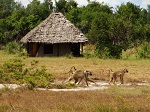
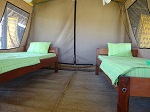
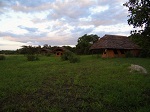
Transport
As standard, we use a spacious 7-seater, 4×4 safari Land Cruiser, with pop-up roof, fridge and phone/camera charging facilities. This is the perfect safari vehicle.
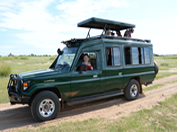
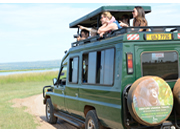
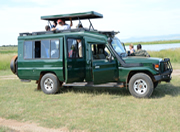
Alternatively, we offer a slightly cheaper 7-seater, 4×4 safari van with a pop-up roof.
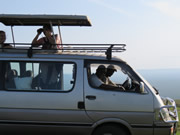
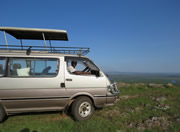
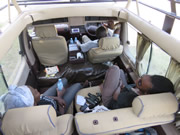
5-seater versions of both Land Cruisers and vans are also available.
For large group tours we use small buses called Coasters. These usually seat around 28 people, including 5 jump (fold-down) seats in the aisle. They do not have a boot/trunk so luggage is carried on the back seats which reduces the seating capacity. The overhead luggage shelves are small and can only accommodate small bags. Therefore, we recommend you do not over pack.
All vehicles include a driver/guide and fuel for your itinerary. Additional activities, not included in your itinerary, may incur an additional fuel charge. Our vehicles are comprehensively insured, in good mechanical condition and have seat belts fitted.
Please let us know if you have any special travel requirements. For example, if your group has disabled members we will do our best to accommodate your needs.
